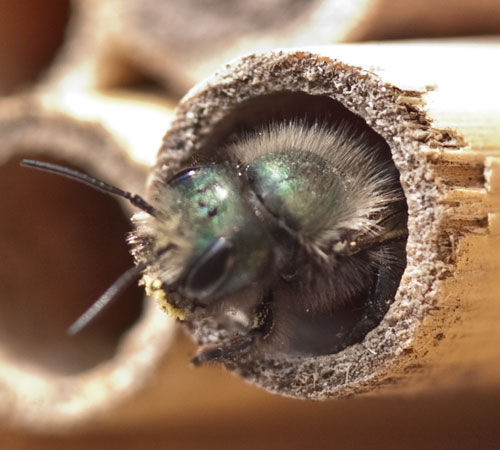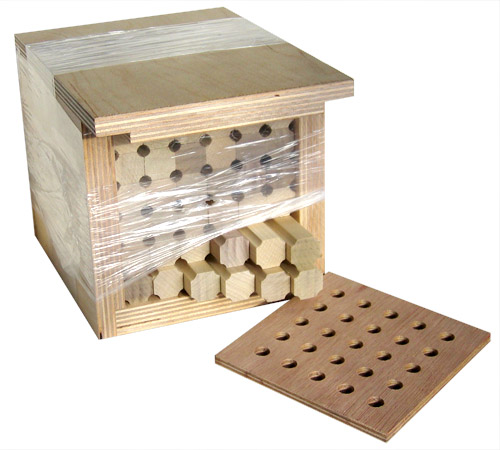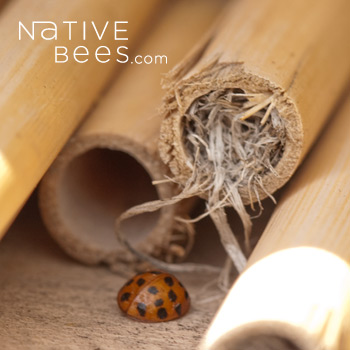
Keep Mason Bees and other Native Bees to improve your pollination!
While supplies last

ORDER MASON BEES, NOW!
We only ship adult Mason Bee (Osmia lignaria propinqua) pupae to the Intermountain West within the United States. Cocoons will be shipped beginning January 2015.
Orchardist Bee Condo Prototypes, Available March 2015
While quantities last
This year's bee condo should last you at least 5 years, if not longer, possibly a lifetime. Our condos don't require annual replacement, like paper straws and reeds require. Furthermore, this year's "Hex Condo" remains dimensionally stable, allowing your pollinating mason bees cozy nesting for consecutive seasons.
Since our early 2009 model pictured below, customers from nearly every state in the country have lined up to purchase our unique mason bee condos. With each new year the innovation continues, and our Patent Pending condos continue to sell out. With each revision, NativeBees.com is beginning to understand the preferred nesting environment of Osmia lignaria.
Support our cause by purchasing a 2015 condo, and give us all the feedback you can muster!

Contact NativeBees.com at 801.458.0282 for questions.
Gardening for Native Bees in Utah and Beyond
Download this USU Extension Service bee-friendly plant guide for a detailed analysis of trees, bushes, perennials and annuals that are attractive to bees.
Phacelia tanacetifolia and Phacelia ciliata seeds are also available for purchase from NativeBees.com.
Colony Collapse Disorder, the honeybee (apis) problem
Because our emphasis is related to commercial apis beekeeping, we are often asked about Colony Collapse Disorder, or CCD. There are many facts available from scientists and commercial beekeepers about CCD. NativeBees' associates recently attended a USDA Pollinator Conference in Utah that revealed excellent statistics about CCD, listed below.
The most common REPORTED causes of honeybee losses from 2008-2009:
- Starvation: affected 41% of participating beekeepers
- Queen failure
- Weather
- Mites
- Too weak in the fall
- Nosema (dyssentary)
- Management
- CCD
- Pesticides
Colonies affected by CCD
| Year | Managed honeybee losses (apis) |
|---|---|
| Prior to Varroa Mite (U.S. invasion began in 1987) | 5-10% |
| Prior to CCD (began in 2006) | 15-20% |
| 06-07 CCD (Winter) | 32% |
| 07-08 CCD (Winter) | 36% |
| 08-09 CCD (Winter) | 29% |
As shown, the largest cause for managed honeybee losses is starvation, which is a human mismanagement problem.
Mason Bee Home “Squatters”
Mason Bees are not the only creature that inhabits the .27" to .33" diameter hole. Ladybugs and Isodontia (the grass-carrying wasp) can take residence in your mason bee homes, depending on your location and climate. Although the wasp that builds these nest can appear frightneningly scary, don't be alarmed. It does not typically go after humans, just tree crickets.

Survey for Mason Bee Owners
To assist in furthering our native bee environments,
take the Mason Bee Owner's 10-Question Survey!
Phragmite Reeds for Mason Bees (Osmia lignaria)
$15 for 50 reeds. One order per customer
Our reeds are grown in Utah and are natural and completely harmless to solitary bees. Because reed openings and lengths vary in size, reeds offer an advantage over the dimensional uniformity of mason bee straws and tubes. Hollow reeds make perfect nesting homes for Mason Bees (Osmia Lignaria) and other native bee species that assist in pollination, but also require time and caution when accessing the cocoons.
Reeds vary in size from 5" to 9" in length. Diameter of opening is between .27" and .35"
$10 payments may be made through PayPal by clicking “Send Money” to info@nativebees.com
For questions about reeds send us an e-mail.